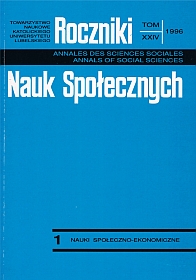Chrześcijańska demokracja: przesłanki jej nowego etapu rozwoju na zreformowanych zasadach
Abstrakt
The incentive to the author of this article to undertake the problem were poor electoral results, gained by the Christian democratic political groupings in Poland during the parliamentary elections in 1991 and 1993, as well the presidential ones in 1995.
The article is based not only on written sources, but also on the personal experience of the author, that participates in the dramatic history of the main Ch.D. movement representative in Poland since 1945, namely the Polish Labour Party (Stronnictwo Pracy).
In the international scale, the most important socio-economic programmes were embodied in two Manifestos, issued in 1976 by the World and European Ch.D. Unions. They advocated for a multisectorial national economy model, with a quite important public sector. The same socially radical option has been continued later in 1993 on the occasion of the Ideological World Ch.D. Union Conference in Chile.
To the main principles, on which is based the World Ch.D. movement platform, belongs − besides Fredom and Solidarity − the social Justice (Equity) principle. Within the Ch.D. most important parties an influential place is reserved for a working class wing, defending the hired workers, and other low paid employee groups, justified economic interests.
The Polish Labour Party main programmes from 1937 and 1945 promoted, as well, a moderated center-left tendency, aiming at the multisectorial model of the national economy and the socialization of the highest personal incomes. After 1989 we have developed a Polish version of the Social Market Economy systems concept, as a positive solution for all so called postsocialist countries.
From these mostly positive tendencies in the Ch.D. movement abroad and in the authentic Polish Labour Party − differ, in a negative sense, economic programmes of the actual Ch.D. groupings in Poland, shifting into a rather right-conservative direction.
The article ends with two proposals, aiming at an renewal of the Ch.D. movement (not only in Poland): 1. A transition from a narrow, denominational Christian democracy formula − to a broader corporative democracy one − of an oecumenical character. 2. Of a return to the evangelical pooroption idea − not only in official declarations, but also in the current economic and political practice.
As a way of carrying out these two proposals in economic and political life − may be seen a closer cooperation with the popular, peasant party, PSL.
Copyright (c) 1996 Roczniki Nauk Społecznych

Utwór dostępny jest na licencji Creative Commons Uznanie autorstwa – Użycie niekomercyjne – Bez utworów zależnych 4.0 Międzynarodowe.


